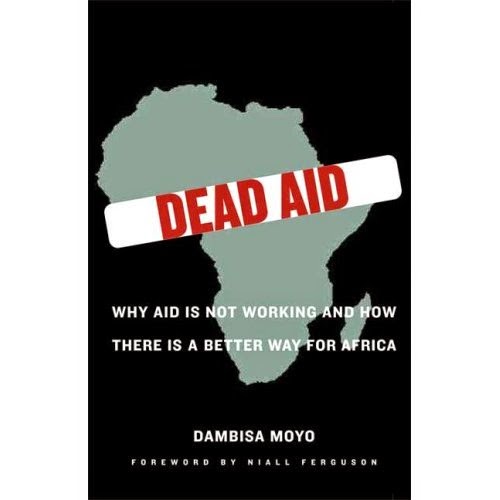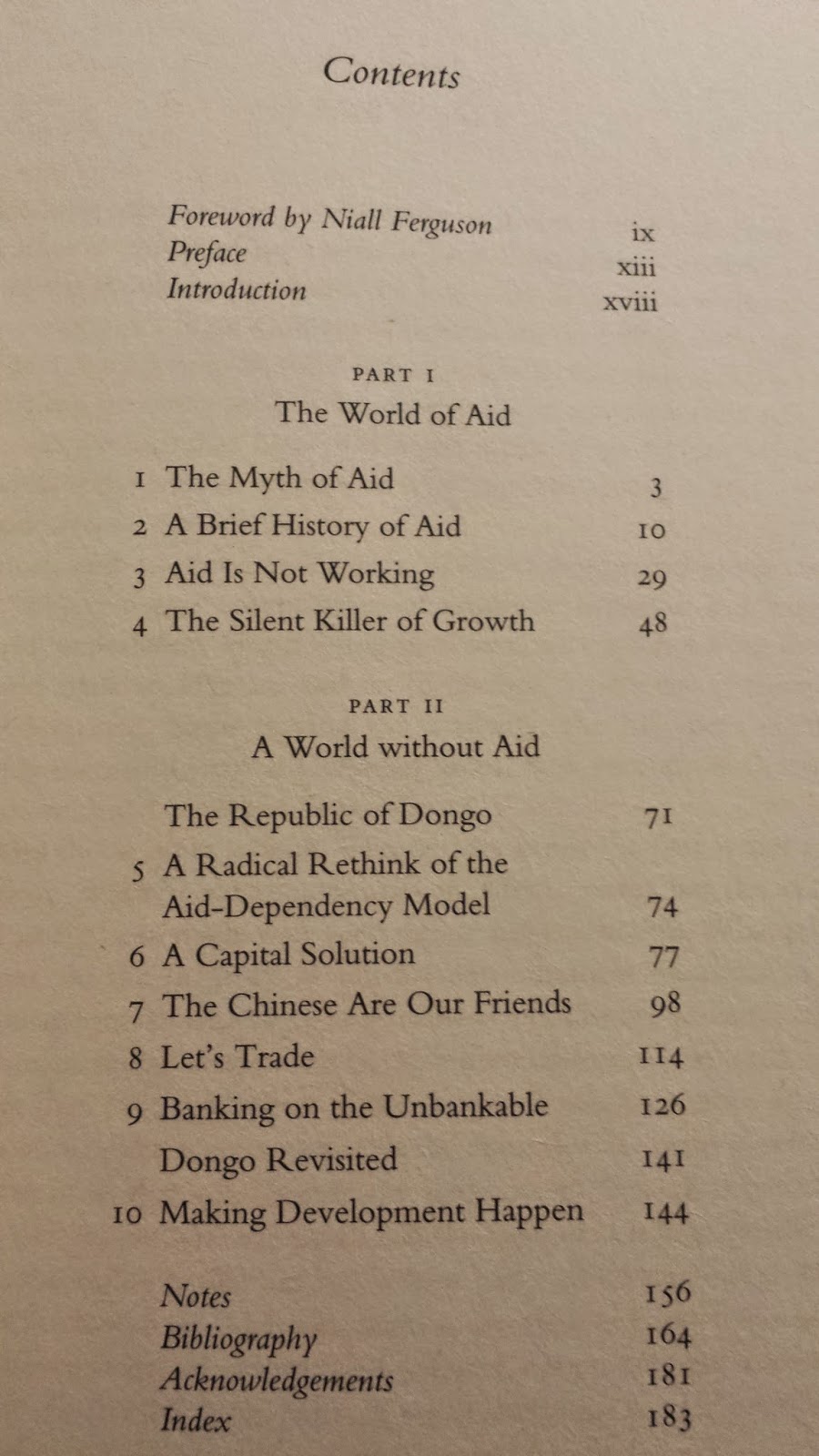DEAD
AID—WHY AID IS NOT WORKING AND HOW THERE IS A BETTER WAY FOR AFRICA by
DAMBISA MOYO [
Title: DEAD
AID—WHY AID IS NOT WORKING AND HOW THERE IS A BETTER WAY FOR AFRICA
Author: DAMBISA MOYO
Publisher: FARRAR,
STRAUS AND GIROUX
Thesis
Dead Aid by
Dambisa Moyo argues and proves that billions of dollars in aid sent from
wealthy countries to developing African nations has NOT helped to reduce
poverty and to increase growth.
Author
Dambisa Moyo was born and raised in
Zambia. She has a Ph.D. in economics from Oxford University and a
master’s from Havard University. Moyo was a consultant for the World
Bank, and worked at Goldman Sachs for eight years.
 |
| Dambisa Moyo |
The Myth of Aid
What makes Africa incapable of joining
the rest of the globe in the twenty first century? For Moyo the
answer has its roots in aid. There exist three types of aid: 1)
humanitarian or emergency aid, 2) charity-based aid, and, 3) Systematic
aid.
The systematic aid means that the aid
payment is made directly to governments either through government-to-government
transfers (called bilateral aid) or transferred via institutions such as World
Bank (multilateral aid). Here Moyo concentrates on systematic aid
because it is where billions of dollars are transferred each year directly to
poor countries’ governments. There are a number of drawbacks in the
ways by which the first two types of aid are implemented. But the
charity and emergency aid are negligible in comparison with the billions
transferred in systematic aid. Moyo states that there isn’t much difference
between the loans and grants provided to Africa. She writes: “Therefore, for
the purpose of this book, aid is defined as the sum total of both concessional
loans and grants. It is these billions that have hampered, stifled
and retarded Africa’s development. And it is these billions that Dead
Aid will address.”
A Brief History of Aid
The subtitles in this chapter are:
a) The
1960s: the decade of industrialization
b) The
foreign aid agenda of the 1970s: the shift to a poverty focus
c) The
foreign aid agenda of the 1980s: the lost age of development
d) The
foreign aid agenda of the 1990s: a question of governance
e) The
foreign aid agenda of the 2000s: the rise of glamour aid
f) We
meant well
 Under the subtitle We meant
well Moyo writes: “It (aid) remains at the heart of the development
agenda, despite the fact that there are very compelling reasons to show that it
perpetuates the cycle of poverty and derails sustainable economic growth. […]
Aid is not working. And here is why.”
Under the subtitle We meant
well Moyo writes: “It (aid) remains at the heart of the development
agenda, despite the fact that there are very compelling reasons to show that it
perpetuates the cycle of poverty and derails sustainable economic growth. […]
Aid is not working. And here is why.”
In the next chapter Moyo explains why
aid is not working.
Aid Is Not Working
The subtitles here are:
1. Does
aid work?
2. The
Marshall Plan
3. The
IDA graduates
4. With
conditionalities
5. Aid
success in good policy environments
6. Aid
effectiveness: a micro-macro paradox
The proponents of aid point to six
proofs that aid can work effectively. But Moyo, in this chapter,
exposes the ways with which aid annihilates the possibilities of the emergence
of a self-sufficient economy. One by one Moyo successfully refutes
the arguments in favour of aid. She lays down examples that leave no
ambiguity in the mind of the reader.
She
gives the example of a mosquito net maker in Africa. He manufactures
around 500 nets a week. He employs 10 people, and each one of the
supports upwards of 15 relatives. But they can’t make enough nets
needed in the market to combat the malaria-carrying mosquito. Now
enters the scene a Hollywood movie star who manages to collect and send 100,
000 mosquito nets to the afflicted region. The nets arrive and are
distributed. But now the mosquito net maker is put out of business
as the market is flooded with foreign nets. His ten workers become
unemployed and thus their 150 dependents now have to depend on hand-outs. Moyo
writes: “…and one must not forget that in a maximum of five years the
majority of the imported nets will be torn, damaged and of no further use. This
is micro-macro paradox. A short-term efficacious intervention may
have few discernible, sustainable long-term benefits. Worse still,
it can unintentionally undermine whatever fragile chance for sustainable
development may already be in play.”
Towards the end of this chapter Moyo
writes that this book would not have been written had the aid done what it
claimed it would do. She concludes, “In fact aid is the problem.”
The Silent Killer of Growth
The title of the 4th chapter
is self-explanatory. The silent killer is none other than the
aid. The subtitles in this chapter are:
I. The
vicious cycle of aid
II. Corruption
and growth
III. Aid
and corruption
IV. Aid
goes to corrupt countries
V. Why
give aid if it leads to corruption?
VI. Corruption:
positive or negative?
VII. Aid
and civil society
VIII. Aid
and social capital: a matter of trust
IX. Aid
and civil war
X. The
economic limitations of aid
· Aid
reduces savings and investment
· Aid
can be inflationary
· Aid
chokes off the export sector
· Aid
causes bottlenecks: absorption capacity
XI. Aid
and aid-dependency
XII. Aid
objections
Moyo in this chapter introduces Peter
Bauer who was one of the earliest critics of aid. He was a Hungarian-born
London School of Economics economist. Bauer argued that aid
interfered with development as the money always ended up in the hands of a
small chosen few, making aid a ‘form of taxing the poor in the west to enrich
the new elites in former colonies’.
Part two of the book is titled A
World without Aid. Moyo gives the example of The Republic of
Dongo which as an African nation faces all kinds of threats varying
from HIV-AIDS to civil war. She believes Dongo will only
change if its fundamental modal of aid-dependency is abandoned and the Dead Aid
proposal of this book adopted wholesale, in its entirety.
A Radical Rethink of the Aid-Dependency Model
1. Governments
need cash
2. Weaning
off the addiction: no one said it would be easy
A Capital Solution
1. Rebounding
from a default
2. Can
Dongo tap the markets
The Chinese Are Our Friends
1. Why
FDI does not flow to Africa
2. What
does Dongo need to do to attract FDI?
3. The
Chinese are our Friends
4. Objections
to China in Africa
5. They’ve
got what we want, and we’ve got what they need
Let’s Trade
1. Dongo
can benefit from trade
Banking on the Unbankable
1. Remittances
2. Savings
Making Development Happen
1. Grasping
the nettle
2. Who
will bell the cat?
In the Foreword Niall
Ferguson writes:
“Moyo offers four alternative
sources of funding for African economies, none of which has the
same deleterious side effects as aid. First,
African governments should follow Asian emerging markets in accessing the
international bond markets and taking advantage of the falling yields paid by
sovereign borrowers over the past decade. Second, they should encourage the Chinese policy of large-scale
direct investment in infrastructure. (China invested US$900 million
in Africa in 2004, compared with just US$ 20 million in 1975.) Third, they should continue to press for
genuine free trade in agricultural products, which means that the US, the EU and
Japan must scrap the various subsidies they pay to their farmers, enabling
African countries to increase their earnings from primary product
exports. Fourth, they should
encourage financial intermediation. Specifically, they need to
foster the spread of microfinance institutions of the sort that have flourished
in Asia and Latin America. They should also follow the Peruvian
economist Hernando de Soto’s advice and grant the inhabitants of shanty towns
secure legal title to their homes, so that these can be used as
collateral. And they should make it cheaper for emigrants to send
remittances back home.”
Moyo ends the book with an African
proverb:
The best time to plant a tree is twenty
years ago.









.jpg)